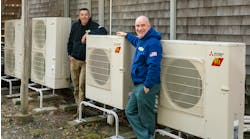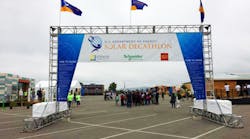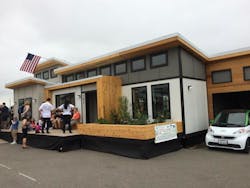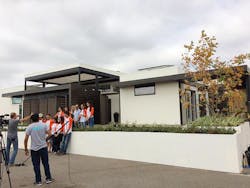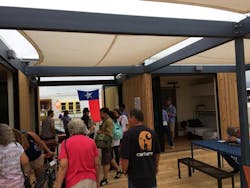Latest from Solar
IAPMO Seeks USHGC Task Group Members
Heat Pumps Get Us to Net Zero
Sponsored
IRVINE, CA – Demonstrating just how cost-effective, appealing and livable energy-saving houses powered by solar energy can be, the University of California, Davis, and Mass/Central America (Western New England University, Universidad Tecnológica de Panamá, and Universidad Tecnológica Centroamericana) tied for first place in the Affordability Contest, and Stevens Institute of Technology claimed first place in the Market Appeal Contest, at the U.S. Department of Energy Solar Decathlon 2015. These contests encourage teams to design and build reasonably priced houses that are comfortable and attractive and combine highly energy-efficient construction designs, energy-efficient appliances and renewable energy systems.
“Most of the highly efficient designs and products on display at the U.S. Department of Energy Solar Decathlon are available today and can help anyone save money by saving energy at home,” said Richard King, Director of the Solar Decathlon for the U.S. Department of Energy. “The Affordability and Market Appeal contests show just how cost-effective America’s energy-efficient houses have become, and that energy-saving features are well within the reach of most families.”
The Solar Decathlon involves 10 contests – each worth 100 points – that evaluate affordability, market appeal, architecture, engineering, communications, comfort, appliances, and the level of energy produced versus energy consumed, among other competition aspects. Each contest is worth 100 points – for a possible total of 1,000 points.
The University of California, Davis, and Mass/Central America (Western New England University, Universidad Tecnológica de Panamá, and Universidad Tecnológica Centroamericana) took first place in the Affordability Contest and earned the full 100 points by constructing houses estimated to cost $249,312 and $120,282, respectively. Texas/Germany (The University of Texas at Austin and Technische Universitaet Muenchen) earned second place with 98.16 points for their house estimated to cost $268,399. Third place in the Affordability Contest went to the State University of New York at Alfred College of Technology and Alfred University with 98.14 points for its house estimated to cost $268,637. Full details on the cost estimates for each house will be posted at http://www.solardecathlon.gov/2015/competition-scores-affordability.html.
In the Affordability Contest, teams earned the full 100 points for achieving a target construction cost of $250,000 or less, as evaluated by a professional cost estimator. A sliding point scale was applied to teams with estimated house construction costs between $250,001 and $599,999. No points were awarded to teams with houses that cost $600,000 or more.
Nate McGhee and Peter Schneider, both professional cost estimators at Faithful+Gould, were the contest jurors. McGhee and Schneider worked the last 10 months evaluating each team’s house to determine accurate cost estimates for the contest.
The results of the Market Appeal Contest also were announced today. Stevens Institute of Technology took first place with 98 points for its SURE HOUSE for energy-conscious shore residents who are vulnerable to flooding and blackouts caused by extreme weather conditions. California Polytechnic State University, San Luis Obispo, took second place in Market Appeal with 93 points for its house that is designed for coastal California. The house features a 15-foot glass wall in the living room that folds back to double the living space. Clemson University took third place with 96 points for its Indigo Pine house, which assembles like a jigsaw puzzle without the use of power tools.
The Market Appeal Contest evaluates the livability, marketability and constructability of each house and its appeal within the housing market of the target client chosen by each team. The Market Appeal jury, composed of professionals from the sustainable housing industry, evaluated the responsiveness of the house designs to the characteristics and requirements of their clients.
Market Appeal Jurors Brian Baker, owner and director of marketing and design at Studio 26 Homes, and Loraine Fowlow, associate professor of architecture at the University of Calgary, Canada, surveyed the homes. “We were impressed and inspired by the innovation of all the teams, as it relates to meeting their target market needs and requirements,” Baker said. “The Solar Decathlon demonstrates that sustainable homes can be innovative, beautiful and certainly highly marketable across diverse demographics.”
For current overall standings, visit: http://www.solardecathlon.gov/2015/competition-scores.html.
Results from the Architecture and Communications Contests, also worth 100 points each, will be announced Friday, October 16 at 10 a.m. PDT in Hangar 244 at the Orange County Great Park in Irvine, California. The overall winner of the Solar Decathlon will be announced on Saturday, October 17, at 9:45 a.m. Pacific in Hangar 244 at the Orange County Great Park.
Solar Decathlon 2015 teams competing at the Orange County Great Park:
California Polytechnic State University, San Luis Obispo
California State University, Sacramento
Clemson University
Crowder College and Drury University
Missouri University of Science and Technology
New York City College of Technology
Team NY Alfred - State University of New York at Alfred College of Technology and Alfred University
Stevens Institute of Technology
Texas/Germany - The University of Texas at Austin and Technische Universitaet Muenchen
University at Buffalo, The State University of New York
University of California, Davis
Team Orange County - University of California, Irvine; Chapman University; Irvine Valley College; and Saddleback College
West Virginia/Rome - West Virginia University and University of Roma Tor Vergata
Mass/Central America - Western New England University, Universidad Tecnológica de Panamá, and Universidad Tecnológica Centroamericana
The Solar Decathlon houses are open to the public for free tours today through Sunday, October 18, from 11:00 a.m. to 7:00 p.m. There is a $10 fee per vehicle for public parking at the Orange County Great Park during the event (directions and map). For full event information, current standings, high-resolution photos, and videos, visit www.SolarDecathlon.gov. You may also follow the competition in real time on Facebook at Facebook.com/DOESolarDecathlon and Twitter at @Solar_Decathlon. Photos are also available on Flickr at http://www.flickr.com/photos/solar_decathlon/. For downloadable B-Roll of the announcement, visit vimeo.com/doe.
The U.S. Department of Energy Solar Decathlon is an award-winning program that challenges collegiate students from around the world to design, build and operate solar-powered houses that are affordable, highly energy-efficient, attractive, and easy to live in. The competition shows consumers how to save money, water and energy with affordable clean energy products that are available today. The two-year projects culminate in an unprecedented display of affordable green living and design at the Orange County Great Park in Irvine, California. The Solar Decathlon also provides participating students with hands-on experience and unique training that prepares them to enter our nation’s clean energy workforce. Together, the energy innovations demonstrated during the event support the Energy Department's efforts to advance President Obama’s Climate Action Plan and help reduce climate-changing carbon emissions to meet the targets of the Clean Power Plan, while transitioning America to a clean energy economy and saving money for families and businesses.

